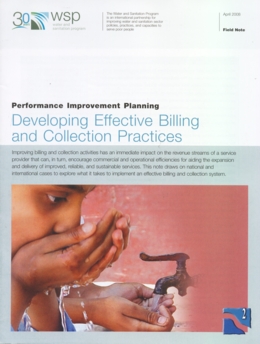|
 Water utilities and service providers in India are plagued with severe deficiencies in the delivery of services, with access to reliable, sustainable, and affordable water supply and sanitation services remaining poor in general. The sector’s worrying performance is caused, among other reasons, by financial and capacity constraints, including the absence of a commercial orientation to services, institutional deficiencies, and the lack of systemic incentives to deliver ongoing quality services. This note draws on national and international cases to explore what it takes to implement an effective billing and collection system that encourage commercial and operational efficiencies for aiding the expansion and delivery of improved, reliable, and sustainable services. The note starts with an explanation of how poor billing and collection hurt the service provider, followed by the key principles of an effective billing and collection strategy, illustrated through national and international billing and collection practices. Contents: Executive Summary Context How do Poor Billing and Collection Practices Hurt the Provider How Can Providers Improve Billing and Collection Practices Addressing Institutional Issues Conclusions References Post Date : 01 April 2009 |